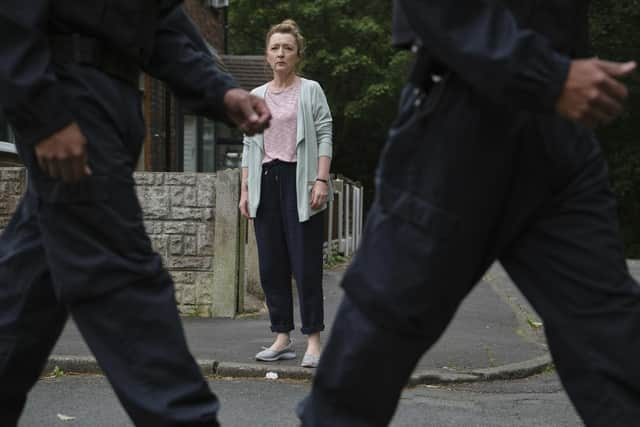BBC's Sherwood defines an age and is the best TV in 26 years - Jayne Dowle
Warning: contains spoilers.
Once in a generation, along comes a television drama which defines the age. It’s been 26 years since I’ve seen anything as good as Sherwood, the six-part BBC drama which takes the 1984 miners’ strike as its pivot.
Before Sherwood was the 1996 series Our Friends in the North, which also brought to life this time in history, along with political ambition, police and local government corruption and the housing scandals which blighted the North-East in the 1960s and 1970s.


Advertisement
Hide AdAdvertisement
Hide AdSherwood has been more than a drama; it’s been a reset button. In the final episode the impassioned speech of Julie (Lesley Manville), the widow of a miner, Gary Jackson (Alun Armstrong) whose murder – based on a true story – formed the crux of the narrative, challenged my own views on towns like Barnsley, where I live.
The “ex-mining, post-industrial” town of Ashfield still defined itself by what it no longer was, Julie pointed out; how could young people, like her grandchildren, imagine a future in a place stuck in the past?
Tapping into broiling undercurrents of disaffection and distance, her words make complete mockery of the Government’s promises on ‘levelling
up’.
When we employ words like ‘ex’, ‘post’ and ‘former’, we’re consigning our identity to what went before, but without any clear way of describing what it is now, and what it might be in the future.
Advertisement
Hide AdAdvertisement
Hide AdI’m considering banishing these terms from my vocabulary from now on, because by using them I am admitting the defeat, cancelling out centuries of history. And actually, you know what?
I’ve had enough of decades of broken promises, that this new industry would be the saviour, or that new shopping mall.
The North and the East Midlands, where Sherwood is set, are full of towns like Barnsley and Ashfield. Some of them helped form the ‘Red Wall’ that fell to the Conservatives in the 2019 General Election. All of them have one question hanging over them – “what next?” – and no politician seems to have come up with a convincing answer yet.
What is even sadder is that beneath these sweeping generalisations we find so many stories of personal alienation, as the drama shows. When the killer is finally apprehended and interviewed by senior police officers Ian St Clair (David Morrissey) and Kevin Salisbury (Robert Glenister), it’s his lack of conviction that defines him, in contrast to the passion that drove on his father’s generation.
Advertisement
Hide AdAdvertisement
Hide AdAnd, it emerges, the killer feels left behind, ignored, unseen, without identity: “I’m not even Northern”, he laments, which reminds us wryly, that at least we can put ‘Yorkshire’ in our own tick box. The detectives look sad and defeated rather than jubilant that they have finally got their man.
Interestingly, Our Friends in the North, also made by the BBC, starring Gina McKee, Christopher Eccleston, Mark Strong and Daniel Craig, came out the year before a seismic General Election which ousted a sleaze and scandal-ridden Conservative government and brought in Tony Blair’s New Labour.
Prophetic? We shall see. What is true, however, is that writer James Graham, who grew up in the village of Ashfield, Nottinghamshire, where his drama is set, certainly anticipated this summer’s discontent.
Whilst politicians seem ever more remote from the concerns of ordinary people, and even complicit in deepening social divisions – in a recent PMQs, Labour leader Sir Keir Starmer accused PM Boris Johnson of actively wanting the rail strikes to go ahead and the country to “grind to a halt so he can feed off the division” – union leaders, most notably, Mick Lynch, of the RMT, are stepping forward into the breach.
Advertisement
Hide AdAdvertisement
Hide AdWho, especially Margaret Thatcher, the Conservative Prime Minister who vowed to crush the unions and nationalised industries such as coal and steel once and for all, would have foreseen that? Especially after all she had – allegedly – done?
One major premise of Sherwood rests on the suspicion that during the 1984 strike, the Home Office and the Metropolitan Police had colluded in sending ‘spycops’ to mining areas to contribute towards an official policy of ‘divide and conquer’ by fomenting further dissent between warring factions; in Nottinghamshire’s case, the minority of miners who belonged to the more militant National Union of Mineworkers (NUM), led by Arthur Scargill, and the Union of Democratic Mineworkers (UDM), which wanted to carry on working.
The implicit message to take from this is that ordinary people have been manipulated before and will be again.
If it’s true, still, that we get the television drama we deserve, I can’t wait to see what the confirmed second series brings.
Comment Guidelines
National World encourages reader discussion on our stories. User feedback, insights and back-and-forth exchanges add a rich layer of context to reporting. Please review our Community Guidelines before commenting.
